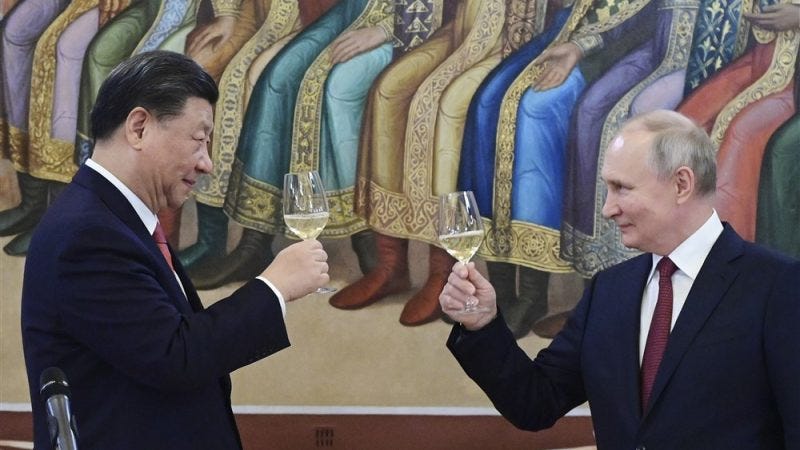Thoughts on the China-Russia relationship
With Xi Jinping's visit to Moscow in a middle of a conflict that plagues Ukraine, and Europe, let's consider the relationship of the two giants, and what it means for the European Union.
Xi Jinping and Vladimir Putin pledged friendship between their two nations. But this temporary alliance, on the backdrop of the conflict in Ukraine and tensions around Taiwan, might hide a difficult reality for the Kremlin’s master.
Become an EU politics and policy expert. Don’t miss any important updates. Register to The Beubble.
A temporary alliance
The state visit of the Chinese leader Xi Jinping to Russia’s Vladimir Putin marks a geopolitical rapprochement between the two Asian giants.
Since the beginning of the conflict in Ukraine, China never denounced Russia’s behaviour. The Chinese economy, which lacks basic resources, was keen to purchase gas and oil once Europe got rid of Russia’s fuels, providing the necessary funds for Putin to finance his “special operation” in Ukraine.
In fact, the situation in Ukraine is probably seen in Beijing as a model (or anti-model) in preparation for an invasion of Tawain.
But this is where the friendliness stops. The resource-poor and capital-rich China will not play Russia’s game for long.
Geopolitical rivalries
Russia and China are increasingly becoming geopolitical rivals. China lacks the resources for its economic ambitions. Russia lacks the capital and funds necessary to increase its economic output. China will buy from Russia the minerals and fuels it needs for its industrial development.
The Chinese demographic growth demands a clean water supply, which the country also lacks. The largest water reserves are located in the Himalayan mountains (already contested by India), and in lake Baikal, Russia, the world’s largest lake by volume. Chinese companies actually started buying land around the lake.
But the increased economic collaboration between the two will benefit the former more than the latter. In fact, Russia risks becoming a junior partner to China, only good to sell its resources.
Furthermore, the influence of Russia over the former Soviet Republics of the middle east is fading to the benefit of China.
What does it mean for Europe?
The European Union was quick to get rid of its energy dependency on Russian fuels. But with China ready to purchase gas and oil from Russia (even at low costs), this means that Putin will be able to sustain its war on Ukraine.
The systemic rivalry that Europe is facing with China is about to be reinforced. Europe is risking to shift its dependency on Russia to an even greater one towards China. The transition from Russian fossil fuels will be possible thanks to Chinese solar panels.
Alexandre Météreau is the author of The Beubble, and a specialist in European policies and politics. Discover more about Alexandre at alexandre-metereau.eu.
Don’t forget to subscribe to The Beubble.






